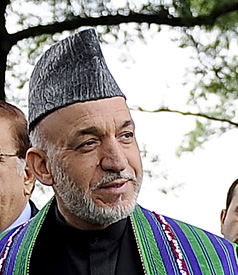Honest, paywall-free news is rare. Please support our boldly independent journalism with a donation of any size.
Kabul, Afghanistan – Afghan President Hamid Karzai’s office on Monday announced that it will close the country’s 52 private security companies by year’s end, a decision that could create more risks along the U.S.-led military’s critical supply routes into Afghanistan.
The announcement appeared to catch NATO and U.S. officials by surprise. Security companies here employ 26,000 people under U.S. contracts; 19,000 of those are employed under military contracts.
“The government of Afghanistan has decided that the security companies have to go,” Karzai spokesman Waheed Omar told reporters in announcing the decision.
If Karzai follows through with the short timeline, the decision could quickly strip NATO supply routes of private forces that have provided protection for convoys that come under constant attack.
It would force diplomatic missions, including the U.S. Embassy in Kabul, to find some other way to protect their compounds.
It could also create a volatile new pool of disaffected militants from the tens of thousands of unemployed security guards, some of whom already are suspected of having links with the Taliban and staging attacks on convoys passing through their areas.
“Security will get worse,” warned Matiullah Khan, one of the country’s more influential figures in the murky security convoy business. “The police can’t provide security in the provinces, so how can they escort convoys?”
Afghanistan’s private security industry is a complex network of registered international companies and unregulated Afghan militias and has long been the subject of angry criticism.
Karzai has long argued that the private firms act as a parallel security force that undermines the nation’s police and army. Many Afghans fear convoy security guards, many of whom have been accused of firing wildly and killing civilians while protecting their routes.
Last month, contactors with DynCorp International were involved in a fatal car crash in Kabul that sparked violent anti-American protests and raised fears that the isolated demonstration could devolve into widespread rioting.
Some of the firms have been accused of using their familial ties to the Karzai government to secure millions of dollars in NATO contracts. One major security company is run by two of Karzai’s cousins. Another is run by the son of the Afghan defense minister.
U.S. officials also have expressed concerns over longstanding allegations that the security firms use NATO funds for the contracts pay insurgents not to attack the convoys.
The myriad of problems was captured amid the documents recently released by WikiLeaks.
One of the leaked incident reports claimed that Khan, the security convoy mogul, had his armed men stop a convoy and demanded that the competing protection force pay a hefty “toll.”
In his first weeks as the new commander of colaition forces in Afganistan, U.S. Army Gen. David Petraeus had moved to craft new regulations on the loosely regulated supply route security.
One NATO official said Monday that they had been caught “flat-footed” by the announcement and weren’t sure how Karzai’s order would impact the supply routes.
“We continue to support President Karzai’s objective of eliminating the need for private security companies and transition of existing private security companies under Government of Afghanistan control, but in a deliberate process that recognizes the scale and scope of the issue,” the U.S.-led coalition said in a prepared statement.
Karzai’s office released no details on the timeline. But security company officials warned that the Afghan government wouldn’t be able to protect the supply routes with its own army and police.
“This whole thing is a knee jerk reaction and will not help but undermine the security of Afghanistan,” said the head of one of the 52 security companies registered with the Afghan government who asked not to be identified because of the risks to his firm.
“This decision, if taken, shows that the government is not making prudent decisions but creating drama to detract attention from its own problems with the ANA [Afghanistan National Army] and ANP [Afghanistan National Police],” he said.
Karzai’s announcement could also expand already frayed relations with NATO officials who have stepped up anti-corruption investigations that have begun to touch upon the highest levels of the Afghan president’s government.
Trump is silencing political dissent. We appeal for your support.
Progressive nonprofits are the latest target caught in Trump’s crosshairs. With the aim of eliminating political opposition, Trump and his sycophants are working to curb government funding, constrain private foundations, and even cut tax-exempt status from organizations he dislikes.
We’re concerned, because Truthout is not immune to such bad-faith attacks.
We can only resist Trump’s attacks by cultivating a strong base of support. The right-wing mediasphere is funded comfortably by billionaire owners and venture capitalist philanthropists. At Truthout, we have you.
Truthout has launched a fundraiser, and we have only 24 hours left to raise $15,000. Please take a meaningful action in the fight against authoritarianism: make a one-time or monthly donation to Truthout. If you have the means, please dig deep.
